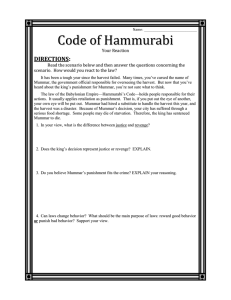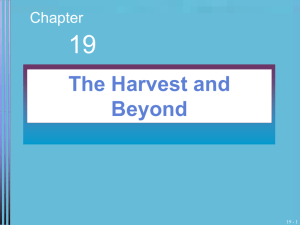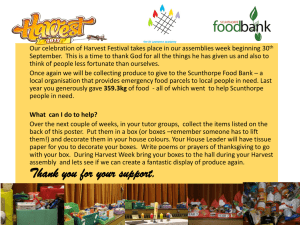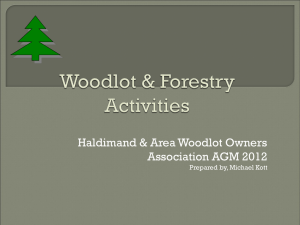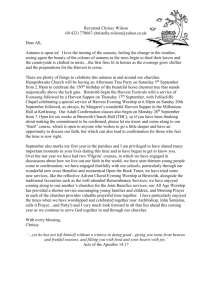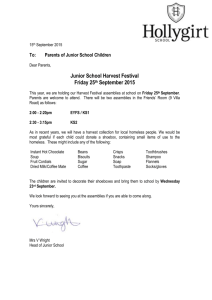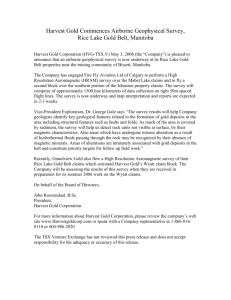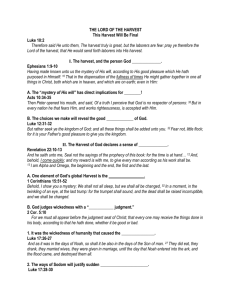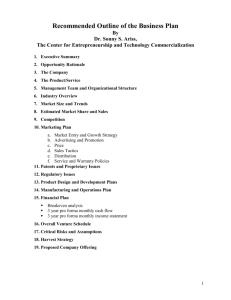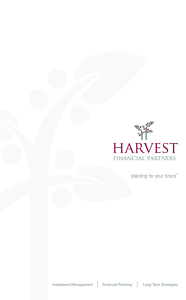Table of Contents - Harvest Collegiate High School
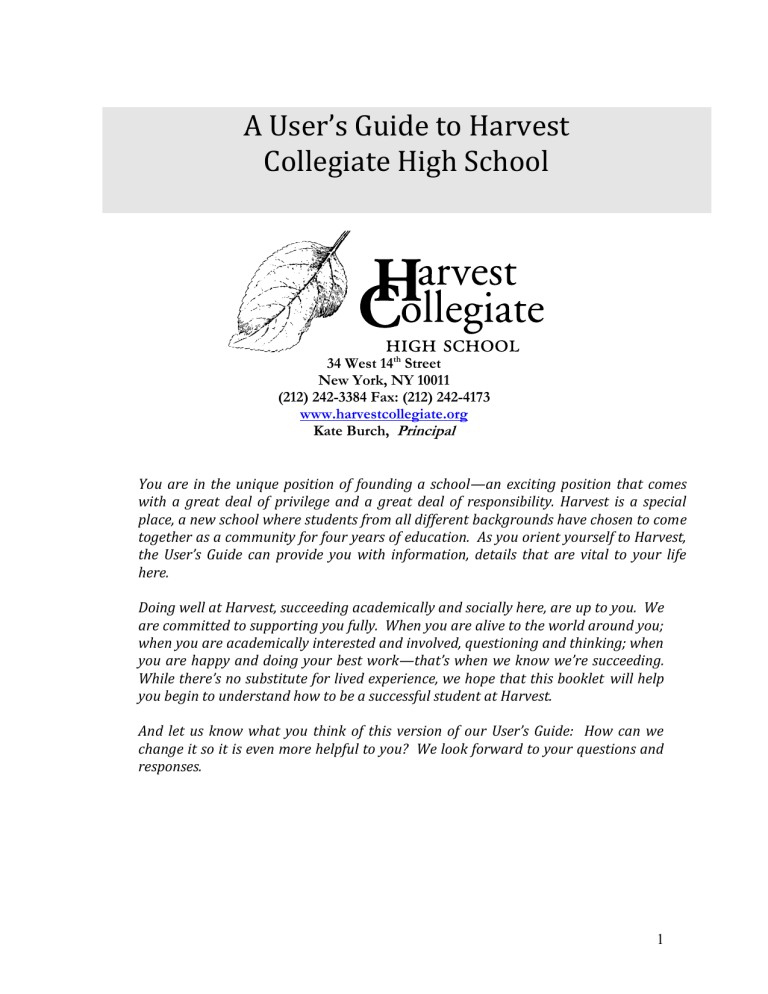
A User’s Guide to Harvest
Collegiate High School
34 West 14 th Street
New York, NY 10011
(212) 242-3384 Fax: (212) 242-4173 www.harvestcollegiate.org
Kate Burch, Principal
You are in the unique position of founding a school—an exciting position that comes with a great deal of privilege and a great deal of responsibility. Harvest is a special place, a new school where students from all different backgrounds have chosen to come together as a community for four years of education. As you orient yourself to Harvest, the User’s Guide can provide you with information, details that are vital to your life here.
Doing well at Harvest, succeeding academically and socially here, are up to you. We are committed to supporting you fully. When you are alive to the world around you; when you are academically interested and involved, questioning and thinking; when you are happy and doing your best work—that’s when we know we’re succeeding.
While there’s no substitute for lived experience, we hope that this booklet will help you begin to understand how to be a successful student at Harvest.
And let us know what you think of this version of our User’s Guide: How can we change it so it is even more helpful to you? We look forward to your questions and
responses.
1
Table of Contents:
I.
Mission and Vision: What is our purpose as a school?
II.
Academic Program a.
An essential education: your Habits of Mind and Heart b.
Authentic Intellectual Work, Gateways, Capstones c.
Reading good books: Do it! d.
An Embarrassment of Riches: Choosing your Courses e.
Open Honors f.
Extra Help: Writing Center, Tutoring. Help is available
III.
The Harvest Community: a.
Advisory b.
Morning Meeting c.
Extracurricular activities: do something you love, twice a week. We offer an incredibly array of extracurricular activities. d. Awards, for academic excellence and community
IV.
Policies a.
Academic Integrity b.
Attendance c.
Bathroom d.
Out Building, sharing it e.
Bullying and Cyber-Bullying f.
The Commons g.
Conflict, how to address it h.
Class Trips i.
DOE Discipline Code, Rights and Responsibilities j.
Dress Code k.
Electronics l.
Homework m.
Inclusion n.
Lockers o.
Lunchroom Norms p.
Respectful language, respectful actions q.
Virtual Communication r.
Visitors
And Consequences s.
When the Ideal Doesn’t Happen . . . Ladder of Referral t.
Fairness
V.
The Year at Harvest: Special Events to Mark the Year
VI.
Who We Are and Who to Go to for What
2
What is Harvest Collegiate High School?
I.
Mission and Vision
Mission Statement: The Harvest School offers a rich and challenging intellectual education rooted in a natural growth cycle of compelling experience, inquiry and the pursuit of precision .
. . We believe in cultivating students’ power to produce and reflect, rather than simply consume, as a fundamental way of being in the world. Our learning experiences are designed to stimulate immersion through disciplined habits of thought on topics of moral or aesthetic significance, while cultivating a powerful sense of competence, autonomy and belonging. We aspire to being, and to contributing creatively to, a “sane society,” one of peace, growth, even joy. We believe all young people flourish in conditions that challenge and support, so in our commitment to diversity and equity, we aim to serve the varied students of the city. We prepare students for success in college and for participatory leadership that promotes The Harvest
School’s values of active responsibility for mankind and our earth.
The Harvest School aims to achieve its mission through:
Focusing on the challenging and engaging work of inquiry in preparation for college with the research, support and partnership of the Institute for Student Achievement
Authentic intellectual work and authentic assessment, tied to clearly articulated Habits of Mind and Heart—Curiosity, Evidence, Perspective, Connection, Voice,
Responsibility, and Creative Contribution—that promote a lifelong love of learning and using one’s mind well
Core values of Commitment to Peace, Commitment to Diversity and Commitment to
Growth in the recognition of fundamental human dignity and the cultivation of students’ belonging, autonomy and competence
A system of distributed counseling where every student is known well receives a web of social and emotional support
The enlargement of life experience through empowering opportunities: o The Harvest Spiral Growth experience: Urban Ecology in 9 we come from?), Service Learning in 10 th
College Exploration in 11 in 12 th grade (What might our future hold?) th grade (Where do
grade (What can we do about it?), th grade (Where are we going next?), Career Internship o Practical experience farming as a site for critical inquiry and action o Every student learning a musical instrument o A January Intensive for travel or immersion learning
So, how do we do this?
II. Academic Program
a. As a community we have defined what is most essential for our students to learn now, and ten, twenty, fifty years into their life. These are:
3
Our Habits of Mind and Heart
Habit of Curiosity: the ability to cultivate attention and openness, the desire to continually seek new knowledge and awareness. o Did I seek further information about the situation and people around me? Did I actively seek to listen and understand others? Did I express interest, or even passion? Was I willing to take a healthy risk, explore and try a new experience? Did I persevere, when the situation became challenging?
Habit of Evidence: the ability to bring together relevant information, to judge the credibility of sources, to find out for oneself. o How do I know what I know? Did I support my views and points with examples and evidence?
Habit of Connection: the ability to look for patterns and ways things fit together in order to use diverse materials to form new solutions. o What else does this connect and apply to? Can I explain the context around this issue? How are we all connected, to each other and our environment?
Habit of Perspective: the ability to address questions from multiple viewpoints and to use a variety of ways to solve problems. o How can I see this problem or situation from a different point of view?
Can I put myself in someone else’s shoes? What if?—how could this be otherwise?
Habit of Voice: the ability to express oneself effectively in order to be understood and to understand others.
o Did I organize present my work in ways that are clear and appropriate to outside audiences? Did I engage in dialogue and writing in order to share my thinking and deepen our group’s thinking? Does the presentation meet professional standards of the field?
Habit of Responsibility: the ability to manage tasks through organization, preparation, persistence and self-monitoring.
o Did I take responsibility for myself and others by showing up, on time and prepared, fostering interdependence? Did I make healthy choices, including asking for help? Did
I reflect honestly? Can I learn from my missteps and consider what I would do differently next time?
Habit of Creative Contribution: the ability to give to, sustain, support or enhance lives and life systems.
o What are we leaving behind? How can I leave it better, more beautiful or just? Have I added something beneficial, sustainable, worthwhile?
Why Habits of Mind? We want students to love what they're learning and use that love to push their minds to think deeply, critically and imaginatively. Our Habits are also values, guidelines for the kind of world we want to live in—where people desire to learn and grow, ask
4
questions and communicate, imagine different perspectives, reason with evidence, help each other and create works of meaning. To cultivate this as a way of being, it needs to become a habit. To make it a habit, it needs continual promotion and reinforcement in language that is clear and consistent—to the students themselves, to their families and to school staff. Since
“what gets measured is what gets improved” every significant student assignment will be assessed according to these Habits of Heart and Mind. This model provides powerful clarity and coherence for both teachers (focusing on the most college preparatory “power skills”) and for students by consistently communicating the high level of expectation for their thinking. b. Authentic Intellectual Work, Gateways and Capstones: How We Ensure We’re
Cultivating Habits
The best place to show your habits is in your actual work—your historical research papers, science labs, literary analysis papers and complex math problems. Our model of education is for students to be producers, not just consumers, in everything they do—their coursework whether investigating a lab, writing a research paper with an original thesis or playing a musical piece.
To that end, Harvest Collegiate asks that you work on certain projects—called Gateways by the end of sophomore year (detailed information is available at http://www.harvestcollegiate.org/news/about/gateways/ ) and Capstones by the end of
Senior Year. Each discipline has its own particular Gateway and Capstone, which will be described by your teachers in lined with advancing thought in the discipline, but it will be a piece of work worthy of presentation to an audience in Symposium.
In order to pass you Gateways to the 11 th and 12 th grades (Upper House), you will need to work and revise until you meet the standards (the rubrics by discipline and for presentation spell these out in detail). We will showcase and celebrate your work, the two of your choice, in public symposium presentations. Symposium are where a small group of students present one at a time. Then the whole group engages in a dialogue around their presentations before opening it up
•
•
• to questions from the audience. Our first Symposium this February showed students making connections, pushing each other’s thinking, presenting with professional polish and all in all, doing great work! c.
Reading good books: Do it!
Why? First of all, to an ever-increasing degree, our society is based on literacy. The goal of a
Harvest education is not mere literacy, however, but attaining expertise at reading and understanding sophisticated texts, the kind of texts that college and the working world require.
Great books can enlighten us. We may disagree what a great book is but please consider these criteria:
Educated, even beautiful language.
Rigorous insights into human psychology, history, science, etc.
Recognition by serious readers and scholars; for example Ralph Ellison’s Invisible Man,
Rachel Carson’s Silent Spring, Shakespeare’s Othello: Huge amounts of material have been written about these books. They are part of every college curriculum. Educated people know them and can discuss them. You should too.
5
• Withstanding the test of time. The staying-power of a book may be a good indication of the fact that its message is universal. For example, Plato’s Socratic Dialogues (ca. 600) or the Old Testament have been read for centuries, adding to the wisdom and knowledge of the world.
These are a few sample criteria. You may disagree with them, or create some of your own, and we hope that you will do both. The fact remains, that a good book is a privileged communication between you and another, highly insightful human being.
Colleges want students whose education has featured the reading of good books. We want you to love reading at Harvest, so we’re constantly trying to find good books that we hope are appealing and interesting. But even more, we want you to value, even to treasure books. Think about it.
Some books that we recommend your reading before you enter college are:
•
•
•
•
•
•
•
•
•
•
•
•
•
• Anna Karenina, Leo Tolstoy
The Art of Loving, Erich Fromm
The Brief Wondrous Life of Oscar Wao, Junot Diaz
Genesis, Exodus, Psalms
The Great Gatsby, F. Scott Fitzgerald
Invisible Man, Ralph Ellison
“Letter from Birmingham Jail,” Martin Luther King, Jr.
• Macbeth, William Shakespeare
Narrative of the Life Frederick Douglass, an American Slave, by Frederick
Douglass
Night by Elie Weisel
Nineteen Eighty-Four, George Orwell
One Hundred Years of Solitude, Gabriel Garcia Marquez
Poems of Rumi
A People’s History of the United States, Howard Zinn
The Ramayana
Song of Myself, Walt Whitman
•
•
•
•
•
•
Song of Solomon, Toni Morrison
The Stranger, Albert Camus
Surely You’re Joking Mr. Feynman, Richard Feynman
Things Fall Apart, Chi Chinua Achebe
To the Lighthouse, Virginia Woolf
To Kill a Mockingbird, Harper Lee
This is just a sampling, but we think it’s a good one. If you’re "stuck" for a good book to read, our staff is knowledgeable and enthusiastic about books and we’ll always be delighted to suggest a good book. d.
An Embarrassment of Riches: Choosing your Courses
A Harvest education starts with questions, questions that you ponder while living your life and questions that mankind has considered over civilizations. Questions such as, “What is a
6
meaningful life? How does musical harmony happen? Who is considered a ‘hero’ in history and why? How does life sustain itself on planet earth?” Different questions may speak to you more at different times. Therefore, within the state requirements, you have the privilege of requesting certain classes. You will always take four years of: English, history, science, and mathematics.
You will have a choice of music or foreign language and as you graduate to Division One (11 th and 12 th grade), you will have an even broader array of electives. While you may not always get your first choice of classes, and we can’t guarantee your course choices for logistical reasons, we will do our best to put you in classes you want to be in since we believe students do their best work when happy. e.
Open Honors
Part of our mission at Harvest is to challenge you to the fullest extent possible. In certain subjects, you may be ready and willing to tackle a more difficult assignment. At Harvest, we offer you the option to apply to our Open Honors program. Honors in one class might mean reading an extra book which will be analyzed in lunchtime Socratic seminars, or doing consistently harder problem sets. Several weeks into each semester, you will apply to your teacher and select those courses in which to do this harder level of work for Honors credit on your transcript. Honors courses are weighted 10% more than a regular course in your
GPA and are highly regarded by colleges, who like to see you taking the initiative to fulfill your potential as a learner and thinker. f.
Extra Help: Writing Center, Tutoring. Help is available
At Harvest, our model is one of high challenge along with high support. Therefore extra
academic help is available every morning at 8am at the Writing Center, as well as two days for mathematics. Help is available afterschool Monday, Tuesday and Friday at the
Writing Center as well as often in science and math; teachers are also generally available by appointment to find a time that works for you. If you are every having trouble in a class, we encouraged to take responsibility for your learning by asking your peers and the teacher to clarify, seek extra help and study/practice more, that time-tested way to learn. The pathway to understanding is there for you to walk it.
III.
Community Participation
One looks back with appreciation to the brilliant teachers, but with gratitude to those who touched our human feelings. The curriculum is so much necessary raw material, but warmth is the vital element for the growing plant and for the soul of the child. –Carl Jung
a.
Advisory
“I am because we are . . .Ubuntu acknowledges that a person is a person through other people”
--Archbishop Desmond Tutu
7
Purpose of Advisory. Advisory is the “home” of every student; the Advisor is responsible for overseeing and proactively addressing the child’s overall well-being, particularly their academic progress, of which attendance is a crucial component. This includes communicating with the advisee’s family, sharing positive updates and seeking further resources and support when necessary. The curriculum of Advisory includes four core components: 1) community building, including knowing and connecting to one another as human beings and leading the community periodically in Morning Meeting 2) academic advising, including goal setting and progress monitoring and course selection 3) Collegiate Futures, including learning about college and career choices, along with some financial planning and 4) social-emotional Health. Since
Advisory is also a space for the cultivation of agency, rotating roles for students—leading discussion on a relevant article, leading Morning Meeting, reporting on current events, decorating the space, leading a teambuilding activity, etc—is also an integral part of Advisory functioning.
b.
Morning Meeting
Morning Meeting. Each morning we have morning meeting as a whole school for 10 minutes. Morning Meeting is a time to transition from the outside world to school, to connect with each other, to affirm and reaffirm our shared values and a space for quiet reflection, to cultivate mindfulness. As with all we do, it is also used to spark an interest in learning.
Advisories will take a rotating role in leading the Morning Meeting.
Monday: reading (individual or choral), Word of the Week, announcements. Moment of
Zen, Quaker-style connections, Mindfulness from research-based curriculum of
Mindful Schools for building concentration, changing impulsive reactions to thoughtful responses and promoting increased student achievement . Rainstorm ritual. Need other fun ritual—rhythm?
Tuesday: individual Advisory time
Wednesday: Presentations of learning from classes. Science Times skit/ aesthetic experience or wonderment (math puzzle, art piece or educational video)
Thursday: Speakers (student and faculty) on habit or theme of the month
Friday: Group sing or musical performance. Community celebrations.
c.
Extracurricular Involvement: Do Something you Love at least twice a Week
We believe extracurricular activities are an ideal way to develop yourself—find new things that make life rewarding, deepen talents, and form friendships around common interests. The expectation at Harvest Collegiate is that each semester you will participate in extracurriculars at least twice a week. (If you are involved with an activity or organization formally outside of school, that may also “count” for an extracurricular; inform your advisor). Living in a democracy, you will be asked to participate in civic life and extracurriculars are a way you can extend the life of the school. College admission officers are often persuaded that students with deep and rich extracurriculars show leadership, maturity, initiative and other qualities they are looking for.
8
For the particular range of extracurriculars we offer this year, please see our Extracurricular
Menu, available on our website and on paper around the school. This year we have over twenty different activities to choose from!
d.
Incentives and Awards: Celebrating each others’
Success
At Harvest we believe in cooperation as the wisest and most effective route to knowledge. We feel that achievement and merit should be acknowledged and honored as well. Students who have distinguished themselves at Harvest because of the quality of their academic work or because they exemplify Harvest Habits of Mind and Heart, and Core Values, receive special recognition during End-term Ceremonies and at Graduation. Teachers within a department select students who have distinguished themselves in their subject work for an Outstanding
Achievement and Most Improved each semester. Most unique to Harvest, your fellow students nominate you for lived demonstration of the Habits of Mind and Heart and Core Values, and each term students receive awards for “Commitment to Diversity” and the other core values.
Valedictorian and Salutatorian are selected through a process of GPA, demonstration of the core values, and reflection and growth over time that you show in written letters (see appendices).
IV. Policies
Our policies always connect back to our core values of peace, diversity and growth and serve to promote our habits of mind and heart.
Academic Integrity. Integrity in academic settings is a fundamental component of success and growth in the classroom. It prepares students for personal and professional challenges as well as providing a blueprint for future fulfillment and success (academicintegrity.org). As a student at Harvest Collegiate high school, you are expected to maintain the highest level of academic integrity in all classes and at all times. It is unacceptable to present another’s work as your own, either on purpose or by accident.
Violating academic integrity includes:
1) Cheating- any attempt to give or obtain assistance in a formal academic exercise without due acknowledgement
2) Plagiarism- the adoption or reproduction of original creations of another author (person, collective, organization, community, or other type of author, including anonymous authors) without due acknowledgment
3) Dishonesty- lying or being deliberately deceptive (i.e. allowing another student to copy your work, giving your homework to another person to plagiarize, etc.) After an initial conference, if the academic integrity policy is violated, a letter will be placed in your file permanently. When applying to college or any post-secondary institution this letter will be sent along with your
9
transcript; this can truly harm your chances of being accepted into the college of your choice or any post-secondary institution. It not only informs your actions of cheating, but also provides insight into the value you place on academic growth.
Attendance policy: When you must be absent because of illness or a family emergency, you and your parents/guardians are expected to call to inform us. At the same time, when you are late or absent, it is our policy to call you, if you have not already called us. Of course, you will need to make up the work you have missed and you must bring an excuse note, certifying that your absence was an excused absence, from your parent or guardian or physician when you return to school. The Chancellor’s regulations for all NYC schools state that attendance lower than 90% is grounds for non-promotion. Low attendance means a risk of summer school or even graduating after four years. Our expectation is that you should surpass this minimum, and only be absent once or twice a year, for a rare excused absence.
An excused absence is a day missed from school because of serious illness (not the sniffles), a family emergency or legal mandate (i.e., a court date). If you are absent from school for some other reason it will not be considered excused. Here are some examples of unexcused absences
(i.e. reasons that are never legitimate to miss school): drivers licensing test; non-emergency medical or dental appointment; sports activity; baby-sitting for a sibling. In other words, school
always comes first. We don’t believe effective education can take place unless school is the top priority.
This is the five-step policy we intend to follow, with specific consequences for unexcused absences:
First absence: a member of our attendance team will call you to remind you of our
Attendance Policy, as well as inform your Advisor to speak with you. For an unexcused absence, there will be a consequence of either a reflective lunch or staying late with the teacher to make up the missed work.
Second unexcused absence: Your advisor will personally contact your parents in addition to a reflective lunch and afterschool make-up.
Third unexcused absence: Your advisor will set up a meeting including you, your parent, the
Advisor and another school adult (such as Social Worker, Principal) to investigate the reasons for your absences. Consequences, including a setting contract, will be determined at this meeting.
Fifth unexcused absence: You will be asked to meet with the leadership either to determine radical strategies for coping with your truancy pattern, perhaps including investigating alternatives to Harvest.
Bathroom Policy. One student at a given time is allowed to go to the bathroom with the pass.
Permission should be asked of the teacher so whereabouts are understood.
Bullying and Cyber-Bulling. We take bullying extremely seriously at Harvest Collegiate and will not tolerate it. If you or someone you know is being bullied—in or out of school, including online—you have the obligation to report it—to your Advisor, Dean, Social Worker or
Principal. We will take the necessary measures to make it stop and ensure the safety of all.
10
The “Commons.” Harvest Commons, the open space when you enter our school, is a shared space for the community to gather. Students please sit with your Advisory for Morning Meeting.
Concerns. We are open to hearing your concerns. If something is happening that is not right, please bring it to your Advisor, Dean, Social Worker or Principal and we will work to address it. No one should suffer at Harvest Collegiate.
Conflict, a natural part of life. We people are truly engaged with each other, conflict happens.
When it does, it is essential that you use the skills you to resolve it: habit of voice (explain yourself), habit. If you need help resolving conflict, you should speak to Atash (or your Advisor or Dean) who can help you and may organize a mediation, a process where a third party helps both sides hear each other and come to an understanding. It is never okay to resort to violence and fighters will receive an automatic suspension.
Class trips. We encourage learning beyond the classroom and have in fact, structured our schedule to include a near weekly field exploration (the Harvest Experience of Urban Ecology, community service, College Preparation, Internship) so as to be minimally disruptive to other classes. All school trips that take place during the school hours must have an educational focus and be viewed as an extension of the curriculum and learning environment.
Discipline Code of the NYC Department of Education. The discipline code of the DOE, attached fully here, outlines all your rights, responsibilities and possible guidance and disciplinary interventions.
Dress Code. Students are at Harvest to learn about ideas, and one’s relationship to ideas, in a community. Everyone appreciates beauty and all students naturally shine but we also desire to help you to focus on your work without distraction. We therefore ask students and teachers to dress in a way that is appropriate, and not provocative, so that we are all treated with respect both in and out of Harvest. Therefore, from just below your shoulder to 6” above the knee
(about the length of a dollar bill) must be covered, and clothing should not be skin-tight. In short, the policy requires that we not see any undergarments, cleavage or rear end. No buts about it!
Furthermore, the content of all clothing must be appropriate at all times. Vulgarity, violence or reference to any illegal activity is not in line with our core values. Out of respect for the policy of the building we are moving into, hats and sunglasses must be removed upon entry into the building. Students outside of the dress code will be asked to change or sent home while responsible for their work.
Electronics. Students: please put away all put away all cell phones, ipods and other electronic devices before entering the building. The Chancellor’s Regulations for the City of New York forbid any use of student electronics in schools; if not, schools have a right to confiscate them and send them downtown for parent pick-up weeks later. Out of school, new technologies can entertain us and enhance our communications, but in school they usually distract us from our educational work and so any electronic use needs to be completely out of hearing and sight
11
(including headphones). If a student is abusing our electronics policy, we reserve the right to confiscate the electronics device.
Research shows that incessant use of these devices may actually alter our brain’s attention patterns. If no electronics use during school hours seems challenging at first, we believe it is worth doing; cultivating your focus will let you pursue your goals in life more deeply.
Homework. Homework is used as a time to extend learning, prepare for classroom discussion and practice important skills. Homework is an important occasion to foster responsibility and independence, vital attributes for college and for life. In addition to our reading expectation of half an hour in the evening (ideally an hour), students should be prepared for about half an
hour in each academic subject, or approximately two hours a night.
Inclusion. In line with our commitment to Diversity, we have a philosophy of full inclusion for special needs students who will be placed in the least restrictive environment possible according to their Individualized Education Plans.
Lockers. You will be fortunate to have your very own locker at Harvest, but for security reasons must only use the locker that is assigned to you. Please bring in your own combination lock and register it with our Community Associate so that your belongings can be securely stored. Appropriate times to go to your locker are before Morning Meeting starts (before 8:30) or after school at 3:17 so please organize your materials for the day so that you have what you need.
LUNCHROOM Norms
A few norms make lunch an enjoyable time for all:
1. Lunch is a time to enjoy one another's company, to be together, take a break and eat.
2. "Don't yuk my yum": refrain from criticizing our sources of nourishment. Someone else might be enjoying it, and this food keeps us healthy.
3. Speak softly and be friendly. Be respectful and thank all members of the community—this includes our cafeteria workers and custodians.
4. Walk, don’t run. Cooperate.
5. Clean up your own space. Please make the effort in keeping the lunchroom clean for everyone.
Respectful language, respectful actions. “Playfighting” is not allowed! As they teach us in kindergarten, please use your words and not your hands.
Virtual communication. We ask you to avoid “friending” teachers in a social network until graduation. School announcements and communication can be posted through our official school Facebook site.
Visitors. Visitors are not permitted except with explicit permission of the school (such as scheduled 8 th grader visiting the school or parent volunteer). Any other visitor must be approved in advance by the Principal.
12
ii.
When the ideal doesn’t happen . . . Ladder of
Referral
There are three kinds of infractions, which helps to think about our response and appropriate consequences. You should also familiarize yourself with the DOE’s Student Rights and
Responsibilities and ranges of possible consequences for each infraction.
Responding to Violations of Harvest’s Core Values
Level One — Disruption
Disrupting teaching and learning; disturbing the learning environment.
Examples:
Disrupting teacher and/or classmates
Arriving to class late
Not returning to class in timely manner after leaving for the bathroom
Leaving class without permission
Use of electronics/cell phone anywhere in school.
Standard response:
Communicated TO ADVISOR (Teacher tells Advisor that day and Advisor calls home unless teacher prefers to call him or herself)
Phone call home and documented by Advisor
ELECTRONICS visible or heard CONFISCATED for duration of class by teacher (repeat offense or refusal to relinquish becomes Level II)
Level Two — Disrespect
Disrespecting self and/or classmates; instigating conflict.
Examples:
Using attacking/derogatory language to another student
Not listening to/disrespecting an adult
Late to Class 3 times
Cutting class
Refusing to hand teacher electronics after being asked to do so
Refusing to wear appropriate clothing after being asked to do so
Disrespect of school property, gambling
Standard response:
REFLECTIVE LUNCH
SENT TO ADMINISTRATOR (Dean or Principal)
Phone call home; family conference if necessary
FAIRNESS or PEER MEDIATION
ELECTRONICS CONFISCATED
Parents of repeat offenders must come in to pick up cell phone
13
INTERVENTION (Several teachers or adults attend conference)
Level Three — Threatening Safety
Engaging in “non-negotiable” behavior; endangering the school community.
Examples:
Fighting
Sexual harassment
Drug or alcohol sale, possession, or intoxication
Refusing to hand Principal electronics after disrespecting all previous levels
Vindictive destruction or defacement of school property
Standard response:
SUSPENSION
Separated and sent home immediately
Return with Parent/Guardian for family conference with Principal, Dean and Advisor
FAIRNESS, MEDIATION or INTERVENTION as follow-up
iii.
Fairness and our Philosophy of Restorative Justice
“An eye for an eye makes the whole world blind.”--Gandhi
The Fairness Committee (comprised of both faculty and students) is a non-traditional restorative justice model of school discipline. Fairness seeks to create, through structured dialogue and by consensus, appropriate “consequences” for those violations, rather than simply meet out prescribed “punishments.”
As a model of restorative justice the Committee endeavors to 1) inspire empathic and critical selfreflection, by confronting a member of the community with his or her actions and how they have effected others; 2) collectively determine how best to restore and mend the community in the wake of actions inconsistent with its values; and 3) how to reintegrate the member of the community who has violated our values back into the fabric and culture of the school.
V. The Year at Harvest
Children grow into the intellectual life around them. –Lev Vygotksy
Please note all confirmed activities are shared on our google “Harvest Family Calendar,” which is always the most updated version, as this is our rough plan which may change.
September: Habit of Curiosity
Orientation for all students before school starts introducing norms, values, meeting Advisory and discussing summer reading
Welcome to Harvest Night for Families
October: Habit of Responsibility
14
PTA: Curriculum Night for Families
Princeton Blairstown Overnight Teambuilding Trip
College and PSAT Day
Student-led progress report conferences. Students present their work so far to parents.
November: Habit of Voice
Autumn Theater production
Harvest banquet celebrating student reading and advisory spirit for Thanksgiving
December: Commitment to Peace
Urban Ecology family presentations
Math Team presentation
Submit final set of “warning” grades
Winter Solstice Concert, Dance and Potluck for Families
January: Habit of Connection
College Experience Panel (for freshmen on a Wednesday afternoon)
First Gateway presentations
“January Term” Intensive
February: Commitment to Diversity
Winter Staff Retreat. Review of first semester accomplishments and next directions.
Black History Month and Commitment to Diversity Celebration
March: Habit of Perspective
Student-led progress report conferences. Students present their work so far to parents.
Formal hiring process for 2015 commences (posting, sorting, interviews)
April: Habit of Evidence
Quality Review (external DOE review of school practices)
May: Habit of Creative Contribution
Talent Show
Institute of Student Achievement Inventory (formal visit to review adherence to ISA principles)
June: Culmination and Celebration of all Habits and Values
Gateway presentations
Urban Ecology family tours
d. Who We Are
Kate Burch, Principal and Founder
I come to school leadership with over a decade of experience in public schools, and a lifelong love of children, ideas and learning. I previously served variously as a teacher, advisor, service and college coordinator, and
Professional Development Director at Humanities Preparatory Academy, which was chosen by the Gates
15
Foundation as a National Mentor School of the Coalition of Essential Schools, and in my last year in 2010 achieved a 95% four-year graduation rate.
I grew up in Manhattan and graduated from Harvard College with a bachelor’s degree in History and
Literature magna cum laude . I researched and wrote the travel guidebooks Let’s Go: Europe and Let’s Go:
Roadtrip USA , as well as serving as a research-writer on a book about the history of women entrepreneurs Enterprising Women . I have lived and worked in India, the Caribbean, France and in 2007 was a Yale University Fulbright-Hays Scholar to Ghana, West Africa. I have given presentations on instituting the
Common Core, designing theme-based courses, teaching about Africa, Latin America and the Middle East, and instituting Fairness, a panel for restorative justice, at professional conferences in New York and across the country. I hold a master’s degree from Teachers College, Columbia University in International Educational
Development, with a focus on Peace Education. I am passionate about bringing these experiences to bear in a shared commitment to educate the diverse students of our city and to provide them with the powerful learning structures and opportunities they deserve to succeed.
Faculty
Our faculty is exceptional — in its depth of experience, diversity of talents, and commitment to inspiring students.
All faculty emails addresses are the teacher’s first name @harvestcollegiate.org. For example, Ted Sizer’s email would be ted@harvestcollegiate.org.
Marc Beja, Music Teacher
Prior to joining Harvest Collegiate, Marc created a vocal music program at Bread and Roses High School in
West Harlem. He also taught vocal lessons at New York University, where he earned a Master’s in Vocal
Performance with a concentration in Musical Theatre, an advanced certificate in Vocal Pedagogy and a
Bachelor’s in Music Education and Journalism. He has worked as an actor, with TV roles on “The Jury,” “Ed” and “Sideline Heroes of the NFL,” national TV and radio commercials and in the limitedengagement Broadway show Abby’s Song . He has also performed in, directed, musically directed and accompanied shows for school, community and regional theaters throughout New York. As a journalist,
Marc has written and reported for the Associated Press, The Chronicle of Higher Education, Newsday, NYU’s
Washington Square News and amNewYork .
Shirlene Blake, Community Service, Dance and Health Teacher
Shirlene comes to Harvest with a diverse background in performing and teaching various dance disciplines, arts advocacy, dance and special needs, as well as working with pregnant teens and teenage mothers. She has performed professionally all styles of dance with independent choreographers. She has taught nationally and lived and taught in Reykjavik, Iceland. Shirlene received her BFA from Southern Methodist University; MEd from Temple University and holds District and Building Leader Certifications. She is a graduate of the Dance
Education Laboratory of 92nd Street Y and is a high school proctor/adjudicator for the NYCDOE Arts Achieve dance performance assessments. Shirlene is also a NYS licensed Massage Therapist, MELT Hand and Foot
Instructor and has studied accounting and childbirth education. She has strong interest in advancing the arts in education, educational technology and educational collaborations.
Kiran Chaudhuri, English Teacher
Kiran has been a pioneer of the progressive schools movement in New York City over the past two decades — she has extensive expertise in cultivating students’ lifelong love of reading, in field studies and experiential learning and in engaging students with the great texts of the world’s religions, including Gilgamesh, Genesis
16
and Exodus, the Buddha, and The Ramayana. As a teacher, Kiran is a delicate artist who cares deeply about knowing and reaching every student to read, write and express more than they previously thought possible.
Raised in Cambridge, Kiran holds a BA from Oberlin, an MA in the Teaching of English from Teachers
College, Columbia University and has contributed to various professional circles including The Prospect
Institute and The Writing Project. She has published extensively in educational journals and in addition to teaching Humanities, now leads our Art and GSX club.
Faye Colon, Social Studies Teacher
Faye Colon is a Humanities and Spanish teacher from the South Bronx, who has work for New York City
Public Schools since 2011. In her first year of teaching she taught social studies to sixth and seventh graders at the Academy for Personal Leadership and Excellence located in the Bronx and directly following student teaching she was hired by the James Baldwin School to teach part time as a History and Spanish teacher. Faye seeks to develop a Social Studies curriculum that inspires student inquiry and actively engages students in the historical process through debates, Socratic seminars and role-playing activities. Faye earned a bachelor’s degree in Latino Studies and History at Columbia University, and is currently earning her Masters degree in
Secondary Education at the City College of New York. Faye’s research interests include topics in Latin
American and the Caribbean and she also enjoys traveling, trying food from all over the globe, reading, and spending time with loved ones.
Cynthia Douglas, Math Support Teacher
Cynthia Douglas is an educator who believes that students should take responsibility for their own learning and be provided with the tools needed to be academically successful. Cynthia has a passion for helping students to develop skills, become life-long learners and develop a love for reading. She began her career in Newark, NJ teaching history and English through social justice concepts; graduated from Rutgers, The State University of
New Jersey with a Bachelors degree in Africana Studies and English/Creative Writing, and is currently earning her Master’s of Science in Education at City University of New York – Brooklyn College. Cynthia has served the broader community with a number of organizations including AmeriCorps, the Bonner Foundation, the
Civic Engagement and Service Education Program at Rutgers University and Project SHINE at Temple
University. Cynthia enjoys traveling, writing poetry and short fiction, DJing, cooking, and spending time with family.
Angelo Garcia, Science Teacher
Angelo unites his background as a neuroscience researcher at NYU-Mount Sinai coupled with years of teaching at an independent middle school to bring the beauty and wonder of the scientific world to Harvest
Collegiate. Angelo holds a PhD in Cellular Neurobiology. Angelo’s graduate research involved the study of a gene, VGF with a complex function in the brain where it was found to be involved in the regulation of metabolism, spatial learning, and depression. Angelo elucidated a key bioactive part of the protein. Angelo has also contributed his expertise in Biochemistry, Molecular, and Cell Biology to consult on cancer, fibrosis, and the neuroendocrinology of aging; his work has been published in numerous journals. His postdoctoral work focused on the similarities between healing and what is called tissue plasticity, the ability of a mature tissue to undergo changes that enable it to adapt of which learning is one example. Angelo is also interested in the biology of longevity, Alzheimer’s, gene therapy, cancer therapy, the use of antibodies as drugs and the development of biofuels. In a university setting it would be impossible to research all of these areas, but it is
Angelo’s dream to found a senior honors high school research program that involves students in all of these research areas. Angelo: “If I could live a thousand years, I would be a poet, film maker, Industrial designer, philosopher, scientist, and teacher. Since my life span is probably a lot shorter than that, I choose to be a science teacher with interesting hobbies. My goal is not just to empower students but to help them ‘see’ the amazing beauty that is right in front of their eyes if they only could see with the penetrating vision and imagination of a scientist who remains a curious child all of their lives.”
Pamela Hallsson, Science Teacher
17
Pamela puts a student’s need to experiment with his or her environment at the center of all her lessons; she incorporates her strong passion for nature and exploration into her teaching of Biology. She started her career at Chicago Wilderness, an organization that worked to restore the native wildlife to Chicago and educate children outdoors. Pamela then decided to join the field of teaching and earned her bachelor degree’s in
Biology and Art at DeKalb University in Illinois. After moving to New York City she worked at an Exotic
Bird Sanctuary while pursuing her master’s degree in Adolescent Education at Hunter College. She has taught in New York since 2008 as a way to realize her drive for protecting nature and enriching the lives of city kids.
She has developed exciting curriculum including but not limited to the fields of Marine Biology, Entomology, and Microbiology. She encourages activities like bird watching, insect collecting, and planting flowers and loves to witness and contribute to the excitement and awe that students have when they “experience” science. She enjoys hiking, drawing, sci-fi, kickboxing, reading and spending quality family time with her husband and two children.
Paul-Michael Huseman, Science Teacher
Paul-Michael Huseman is a physics teacher who has taught in New York City public schools since 2008.
Promoting student inquiry is the heart and soul of his classroom, where he works to engage students by tapping into their innate inquisitiveness, inspiring them to ask thought-provoking questions, formulate testable hypotheses, and search for meaning. This student-centered, hands-on approach to teaching is the foundation for the curricula he has developed for courses in physics, pure and applied mathematics, and engineering. Paul-
Michael earned a bachelor’s degree in physics and mathematics from Drew University, graduating magna cum laude with specialized honors in physics. He earned a master’s degree (M.S.T.) in adolescent education from
Pace University, studying the effects of web-based assessment tasks on student understanding. In his free time,
Paul-Michael enjoys playing music, reading about politics, doing crossword puzzles, and denying the existence of the Star Wars prequels.
Jessica Jean-Marie, Humanities Support Teacher and Dean
Jessica cultivates youth empowerment and responsibility by leading our Student Government and Restorative
Justice programs. She is passionate about fighting the school-to-prison pipeline that trap too many NYC youth by supporting the positive behavior of all of our students. Jessica grew up in Brooklyn in NYC public schools, earned a Bachelor’s in Arts from SUNY Binghamton, a Master’s in Education from LIU Brooklyn, became a social worker and is now committed to building an education system that helps all students reach their potential. She also works with Scholars for Educational Opportunity to prepare students for the rigors of work at top colleges. She is fluent in Haitian Kreyol and enjoys reading and traveling in her spare time.
Monifa Kelsey, Math Teacher
Over the past two decades Monifa Kelsey has worked in different educational capacities which include serving as a supervisor, a host of school organizational teams, teacher mentor, instructional coach, as well as athletic coach, with students of the age from nursery through college. Monifa earned dual degrees in Mathematics and
Education from Lincoln University (BS) and Rowan University (MA) and is currently pursuing her doctorate in Educational Administration (Ed. D.) at New York University. She believes student success is optimized when professionals, parents/guardians, and students work together to identify goals and create individual action plans to achieve those identified goals. Every school year provides the opportunity to get to know students well, understanding that every child is unique and provide multiple pathways to success. She knows with synergistic effort she can transform the usual incremental growth to exponential growth (to use mathematical language). Monifa is a wife and mother of four. She says, “Every day I challenge myself to become a better version of me, and to be the type of teacher that I would want for my own children.”
Beth Krone, English Teacher
Beth is an English teacher with a dedication to building connections between canonical texts, readers, and contemporary contexts and an investment in generating collegiate-level, seminar-style discussions in class. She
18
graduated from Swarthmore College with a special major in English and Education and earned a credential and a Master’s in education from Stanford University. For three years prior to coming to Harvest, she taught
7 th grade in South San Francisco. Beth is originally from Cincinnati, Ohio, but she has taught third graders in
Costa Rica, and she spends her summer taking English master’s classes through the Bread Loaf School of
English. Beth enjoys academically engaging pop culture and looks forward to using this as a lens on classic literature in her classes at Harvest.
Steve Lazar, Social Studies & English Teacher
Steve Lazar is a National Board Certified Social Studies and English teacher, who is profiled in the book
Teacherpreneurs: Innovative Teachers Who Lead But Don’t Leave . He is passionate about helping students to think deeply about the complexities of the world as they develop their communication skills. Steve is an expert in curriculum and assessment development, regularly delivering workshops for teachers around the country for such organizations as the Gates Foundation, the National Council for Social Studies, National Council of
Teachers of English, and the Institute for Student Achievement. He previously taught at the Academy for
Young Writers in Brooklyn and the Bronx Lab School, where he served as Department Chair, Instructional
Coach, and UFT Chapter Leader; he first taught in Fairfax Co., VA. Steve has a bachelors degree in Political
Philosophy and Religious Studies from Brown University and a masters in African-American Studies from
Columbia University. His article, “Septima Clark: Organizing for Positive Freedom”, which focuses on adult literacy education during the Civil Rights Movement, appears in The New Black History, edited by the late
Manning Marable. Steve’s writing on teaching and education policy have been published in Gotham Schools,
Schoolbook, and Education Week Teacher. You can learn more about him as his blog, Outside the Cave . In addition to teaching, Steve is the Harvest’s Assessment Coordinator and UFT Chapter Leader
Julissa Llosa, Science & Math Support Teacher
Julissa Llosa strives to make physics and algebra as fun and engaging as possible. She previously taught geometry and algebra at a high school in Brooklyn and spent a couple of summers volunteering as a sexual health educator in Peru, her home country. Julissa double majored in Studio Art and Women’s and Gender studies at Dartmouth College and earned her master’s in education from Hunter College. She enjoys riding her bike, yoga, printmaking and laughing. She also volunteers and works with Willie Mae Rock Camp for Girls and The Audre Lorde Project. At Harvest, she co-advises Gender, Sexuality XYZ (GSX) and the Art Club.
John McCrann, Math Teacher
John’s passion for teaching math was sparked by civil rights activist Robert Moses’s Radical Equations: Math
Literacy and Civil Rights and developed out his two strongest professional curiosities: a) finding ways to help students reason more effectively to solve problems that interest them and b) finding ways to empower young people to create a more just society. He is an experiential educator who believes that students learn by doing. He is really excited to apply these values while teaching Math, Urban Ecology, and the after school
Mountain Program club at Harvest. He earned a B.A. in Math with a minor in Social and Economic Justice of the University of North Carolina at Chapel Hill and an M.A.Ed from Wake Forest University where he wrote and published a thesis titled “Re-membering Mathematics: The Effect of Culturally Relevant Lessons in Math
History on Students’ Attitudes”. Previously he instructed courses in Math and Physics, lead department and advisory faculty teams, and directed the schools’ extensive outdoor education program at the Bronx Lab
School. He was born and raised in North Carolina where he also taught for two years; this is why he says
“y’all” quite a bit and will be cranky if the UNC Tarheels lose in any athletic competition.
Laura Mourino, Math Teacher
Laura uses her world experience of over 15 years at United Nations to bring the study of numbers and patterns alive for students. As the Statistician for the United Nation’s Human Development Report Office, Laura worked one-on-one with prominent policy makers including Nobel Laureate Amartya Sen to develop various metrics that captured multi-dimensional poverty. She was the focal point for Latin America of her unit and
19
specialized in gender empowerment and educational policies. Born in Montevideo, Uruguay and fluent in
Spanish, Laura holds a Bachelors of Business and Administration degree from Baruch College, intensive
Graduate studies in Economics from New York University and a Masters in Arts in Education from St. John’s
University; she also has specialized training in Singapore Mathematics and advanced training on quantitative research from the Luxembourg Income Studies. Rooted in New York now to raise her son and committed to education for the past decade here, Laura loves to see the “ah ha” moments of mathematical understanding on her students’ faces. Recently, she was involved with a team of experts in developing STEM performance tasks bundles for the NYC Department of Education as well as the City College STEM Institute. Over the summer, she was a leading member of Hunter College’s Peer Enabled Restructured Classroom grant and mentored several math educators. Laura has earned several awards and recognitions including nomination for Teacher
Fellow of the Year and winning Walsworth’s Yearbook National Yearbook of the Year award in 2011-
2012. Laura enjoys creating Lego designs with her son, visiting aquariums, cycling, raising money for charity and making short films. Laura leads our Filmmaking Club and Student Ambassadors program. Her mantra:
Life is good!
Gina Moss, English Teacher
After earning a Bachelor of Arts from Bard College with a major in literature and a minor in painting, Gina put literature on hold while pursuing a career as an independently-employed graphic designer. Eventually, though, she was called back to her childhood desire to be a high school English teacher, and returned to school to earn a Master of Arts in English Education from the City College of New York. She began her new career at Bronx
Coalition Community School for Technology, where she began to specialize in adolescent literacy, exploring techniques to expand her students’ ability to unleash the power of the written and spoken word. She was invited to participate in a year-long research project in independent reading funded by the National Writing
Project, presenting the results at National Writing Project conferences in Las Vegas and Baltimore. This led to a close association with the New York City Writing Project (NYCWP) and ultimately to five years as an
NYCWP on-site teacher-consultant, advising and coaching teachers in literacy practices at schools in the
Bronx and Queens. Gina has presented her work at numerous conferences, including NYCWP’s Teacher-to-
Teacher, New York State English Council, and Institute for Student Achievement. She was one of five New
York City teacher-consultants selected to participate in the National Writing Project’s three-year National
Reading Initiative, which studied the function of reading in content areas other than English. Gina returned to the classroom in 2009, once again taking delight in fostering her own students’ discovery of the world we live in.
David Sherrin, Social Studies Teacher
David Sherrin is a Social Studies teacher whose passion is to engage all students in learning about the complexities of the past and in participating in deep historical, ethical, and historiographical debates, often through the use of role-playing and the analysis of primary sources. At Harvest, David serves as the
Humanities Department Coordinator, Mock Trial Liaison, and Open Honors Coordinator. Previously, he taught at the Facing History School, where he also chaired the Humanities Department, and at the Abraham Joshua
Heschel School. David spent two years as a street educator for Projeto Axe, a Brazilian organization that provides education and outreach for street children in Salvador, Brazil. He earned a bachelor’s degree in international affairs from Georgetown University, a master’s degree in education from SUNY Empire State
College, and is currently completing his master’s degree in history at Brooklyn College. David has lived, worked, and studied in Ecuador, Chile, and Brazil and he has led workshops for teachers in Rwanda. David’s research interests are in Dutch and Portuguese colonial history and he enjoys traveling, reading, Harrison Ford movies, The Colbert Report , and spending time with family and friends.
Andy Snyder, Social Studies Teacher
Andy Snyder has worked for many years with young people to help them develop their insight, courage, and strength. In his own words, “Why? Partly because he wants to work on his own qualities. Partly because it feels like the right thing to do – to help others develop their capacity to live more deeply. And there’s something magical about a group of people working together to do something really important.” Andy lives in
20
Brooklyn by Prospect Park, sails a small boat in Sheepshead Bay, and originally grew up in Southwestern
Florida. One of his main difficulties in life is that he likes to have challenging discussions but is also an introvert. His interests include philosophy and juggling—he leads our Think TANK afterschool group—and he feels he has room to grow in dancing and writing. Andy is a National Board Certified teacher.
Scott Storm, English Teacher
Scott comes to Harvest Collegiate with a deep passion for the written word, literary theory, and educational research. Scott earned a B.A. with High Honors in English Literature and Educational Studies from
Swarthmore College and a master’s in educational leadership from Bank Street College of Education. Before moving to New York to help found our school, Scott taught for four years in an urban public school in
Pennsylvania where he also designed curriculum and conducted classroom research. Scott has written and presented papers for the National Council of Teachers of English and the Literacy Research Association. Scott is spearheading our Writing Center and, with Improbable Stage Company, our drama program. In his classroom, Scott and his students work to build a community that unites rigorous academic critical thinking with a love for language and literature.
Atash Yaghmaian, Social Worker
Atash Yaghmaian is a licensed social worker with more than a decade of experience working in New York
City public schools and providing social and emotional support for urban youth, recent immigrants, and their families. She received a masters degree from Hunter College School of Social Work in January of 2005 and became certified as a Permanent School Social Worker from the Department of Education in May of
2005. She also has a private practice in which she treats adults through a mixture of talk therapy, hypnosis, and Reiki. She has conducted numerous workshops on trauma for social workers and other health care professional at New York University, various international high schools, and the New York School of
Acupuncture. In her spare time, she dances tango and writes creative nonfiction. She was born in Tehran,
Iran, and has lived in the U.S. since 1990. Atash is the Director of Social Emotional Services at Harvest
Collegiate High School.
In addition to our faculty, our staff includes:
Marita Franzman, part-time Assistant Principal
Denise Hernandez, Secretary
Tyree, Jackson, Community Associate and Parent Outreach
Madgaline Argyros, School Aide
Harry Cabrera, Paraprofessional
Edgewater Mighty, Custodial Foreman
Manuel Diaz, Custodian
Jay Ortiz, Assistant Custodian
School Safety Agents
Carmen Andujar
Leron Harry
Cafeteria Staff
Andre Bullock, Cook
Helen Sutherland, School Lunch Helper
If you have or need . . . Please see:
21
Admissions questions
Assessment or JumpRope questions
Attendance Records
Call home for illness or urgent matter
Computer, copier or printer fixing
Condoms
Course Catalogue
Course selection
Fairness, behavioral concerns, incident reports
Funding requests
Locker assignments
Help with a conflict or Mediation
Idea to make the school better
Metrocards
Morning Meeting presentation idea or Question
Musical request or idea
Parent Organization
Proposal or new idea for the school
Schedule or Program of Classes
Starting a Club
Transcript
Translation Help
Trauma, pregnancy, abuse, self-harm or suicide, homelessness, immigration issues
Urban Ecology idea or question
Website
Working Papers
Kate
Steve Lazar
Denise Hernandez, Secretary
Denise Hernandez, Secretary
Cynthia Douglas; Denise
Hernandez to call the company
Atash and Andy are certified distributors
Your advisor
Your advisor who will bring your request to Paul and Kate for review
Jessica Jean-Marie, Dean or your
Advisor
Kate, Principal
Tyree Jackson, Community
Associate
Your Advisor, Atash or Jessica
Student government
Denise Hernandez, Secretary
Advisory leading it & Kate
Marc or Amy
Shirlene Blake
Kate, Visions or committee chair who oversees it
Paul-Michael Huseman,
Programmer
Kate Burch, Principal
Advisor, then Paul
Denise, Laura, Faye or Randy for
Spanish
Atash Yagmaihan, Social Worker
Faye or John
Marc Beja or Steve Lazar
Denise Hernandez, Secretary
22
